Buying an elliptical for your home can be an exciting and daunting process if you’ve never purchased an exercise machine before. Not only can it be challenging to identify the best elliptical to purchase, but also the best places to buy ellipticals. Fortunately, as BarBend expert reviewer Amanda Capritto, CPT, CES, CNC, CF-L1, CSNC notes, this experience may not be as difficult as it first appears. “People interested in an elliptical for home use will be pleased to find that ellipticals come in a wide range of sizes and styles, with many different options to suit different needs, budgets, and fitness levels,” she says.
In this guide, not only will we examine the best places for buying ellipticals, but we’ll also discuss reputable options for both used and brand-new models. Continue reading as we dive into the different factors that you should consider before purchasing one of these fitness machines.
Where to Buy a New Elliptical
If you are in the market for a new elliptical, it can be overwhelming trying to figure out where to begin. Fortunately, we’ve simplified this process for you. Let’s preview some of the popular places to buy a new elliptical and examine the pros and cons of each.
Brand Website
A brand website can be an excellent option for buying a new elliptical machine. Well-known brands like ProForm, NordicTrack, Sunny Health & Fitness, Schwinn, and Bowflex have user-friendly websites to enhance your buying experience.
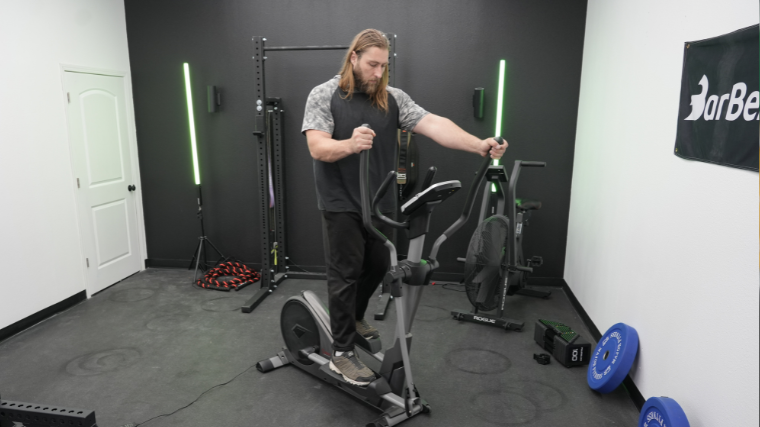
It’s on a brand’s website that you’ll get the most accurate information about a model’s specs and warranty. When browsing the same product on a third-party site, that information can sometimes be outdated or inaccurate. If you’re interested in a specific brand — or love one of the best commercial ellipticals at your gym — then checking out a brand’s website should be your first step.
However, it should be noted that some brand sites will charge full retail price and offer fewer discounts than third-party outlets. Additionally, always take the site’s customer reviews with a grain of salt, as they might not allow critical reviews to be published.
| Pros | Cons |
| User-friendly interfaces | Not as many sales or discounts |
| Reliable specs and warranty information | Unable to test out product beforehand |
| Easy to compare various models | Questionable customer reviews |
Brick-and-Mortar Retailer
To some, brick-and-mortar stores seem like an outdated way to shop for exercise equipment. With massive online outlets like Amazon shipping right to your doorstep, there’s less need to go out shopping at retail stores.
With that said, there are still plenty of benefits to brick-and-mortar establishments. In fact, they’re my preferred choice because you can actually speak to customer reps and ask direct questions. Additionally, going to retail stores allows you to see the size and shape of these models in person, so that you can visualize how they will fit in your home.
[Related: Best Compact Ellipticals]
Some stores will even let you try out the exercise equipment, including testing any integrated apps a machine might have. These stores may also deliver the ellipticals to your homes and, in some cases, set them up in working order. Best Buy, for example, offers delivery for as low as $29.99. Professional assembly, on the other hand, costs an additional $300.
Of course, there are a few drawbacks to brick-and-mortar stores. First, you have to find one that’s located within a reasonable distance of your home. If it’s far, that could mean adjusting your schedule so you arrive while they’re open.
There’s also the possibility that you may arrive only to find the model you want not in stock. In those cases, it’s back to the website you go.
| Pros | Cons |
| Get your questions answered by a real person | Might not have a store near you |
| See the size and shape | Have to rearrange your schedule to go during store hours |
| Try out the cardio machine | Might not have models in stock or available for pickup |
Amazon
Much like Google has become synonymous with online search, Amazon is what we associate with online shopping. It may be hard for some to pinpoint the last time they bought something online that wasn’t from Amazon.
You can find just about anything on Amazon, including a wide range of elliptical machines. (We also have a list of the best treadmills on Amazon.) Amazon’s user-friendly interface allows you to compare different models via price or specs, use filters to improve your product search, watch videos of customers testing out the products, and read customer reviews that are both good and bad.
With that said, it can be a major inconvenience to try and return a product that you bought on Amazon, as you are often dealing with third-party vendors, some of whom may not be fully trustworthy.
Furthermore, warranties can sometimes be harder to activate or ask questions about, and there’s no guarantee that someone will set up your elliptical machine when it arrives. Finally, specs and warranty information can sometimes be outdated or incorrect on an Amazon page.
| Pros | Cons |
| Easy to compare models | Third-party vendors can be difficult and/or untrustworthy |
| More thorough customer reviews | Specs and warranty info can sometimes be incorrect |
| Can watch videos of product reviews to see how they work | Unable to test out a product beforehand |
Where to Buy a Used Elliptical
Buying used exercise equipment can be more challenging than purchasing new machines because there aren’t as many options. Moreover, you have to take extra precautions to avoid any scams. Let’s preview a few of the major places to purchase a used elliptical.
Resale Stores
Resale stores are a credible option for buying used ellipticals, and not just because their prices are going to be easier on the wallet than a big-box retailer. Though they typically have brick-and mortar locations, these stores may also have an online site to review their catalog of items. Going to a resale store in person allows you to see, test, and visualize the elliptical in your home. This is a vital step when buying a used elliptical because you want to assess any wear and tear, not to mention if it operates properly.
The downside to brick-and-mortar resale stores is that there may not be any located in your area. Even with online resale stores, there’s no guarantee that they will ship it to your location. Lastly, resale stores tend to have a smaller selection of models to choose from, so if you’re in search of a particular model you may leave disappointed.
| Pros | Cons |
| Can check the quality of used equipment | May not have a large selection |
| Lower prices | No guarantee of delivery or installation |
| Go in-person to see the ellipticals up close | There may be no stores in your area |
Craigslist/Facebook Marketplace
While resale stores might not be found in your city, it’s likely that you’ll be able to find a used elliptical via Facebook Marketplace or Craigslist. Just type “ellipticals” into the search bar and see how many posts populate for your area. You might be surprised by the volume of options to choose from.
We recommend looking for sellers that have been on Facebook or Craigslist for a while and have detailed notes about the machine’s condition and clear instructions regarding how they’d like to handle the transaction. In fact, on Facebook Marketplace, buyers can leave reviews to share their experiences and warn others if a particular seller is a scammer — this can be very useful when searching for a reputable seller. Unfortunately, Craigslist doesn’t have a system like this in place.
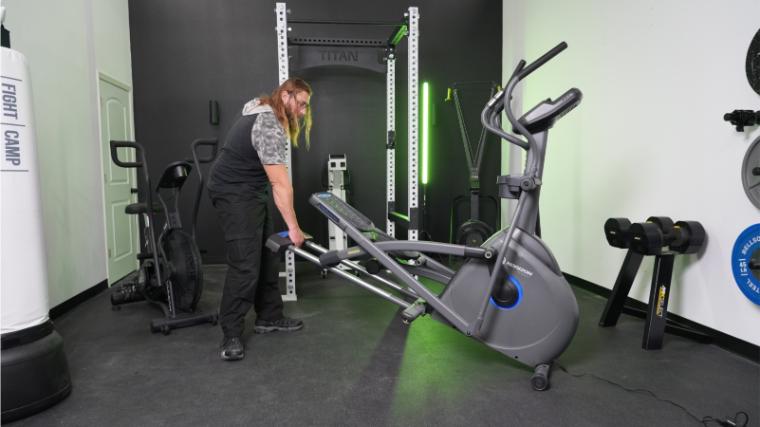
Both online marketplaces will have great deals, as items are usually well below retail price. Your choices, of course, will be limited based on what people are selling, so don’t expect to find one of the best ellipticals with incline on Craigslist.
If you’re buying from one of these sellers, you will likely need to pick up the elliptical yourself or pay for movers, so you’ll want to factor that into your cost. Additionally, some sellers might not be completely forthcoming about the condition of the machine, so be sure to inspect the machine before completing the transaction. Lastly, warranties might have already expired.
| Pros | Cons |
| Lower prices | Increased potential for scams |
| More sellers in your area | Most likely responsible for transport |
| Review system to protect buyers | Warranties may have already expired |
What to Consider Before Buying a Home Elliptical
Ellipticals offer a low-impact workout that can help you burn calories and strengthen your glutes and hamstrings, but having one in your home gym requires more than just a financial commitment. (1) For more on what to consider before buying an elliptical machine, read on.
Ongoing Maintenance
Regular elliptical maintenance and cleaning is vital to the longevity of your machine. To keep your equipment operating at optimal levels — and to lower any potential usage-related expenses — we recommend the maintenance schedule below.
| Daily/Weekly | Clean/wipe down machine Vacuum around and underneath the equipment Check for any system or app updates |
| Bimonthly | Make sure there’s no damage to cords and cables Check the machine for loose screws or bolts Lubricate elliptical arms and other moving parts Examine pedals for cracks or loose connections |
| Annual | Check the drive belt for wear and tear Schedule a professional inspection for potential underlying issues |
Getting It Home
Getting your elliptical home is a crucial aspect to the entire purchasing process. For online orders, the machine will be delivered to your doorstep. Sometimes, the delivery fee includes the cost of assembling your equipment. If not, you can often pay an additional cost for this benefit — unless, of course, you plan on assembling it yourself.
Most brick-and-mortar stores also have a delivery option. However, they may not assemble the machine for you. Make sure to ask the store’s customer rep if they assemble the machine upon delivery or if they can recommend a service that will do this for you.
If you purchase an elliptical machine from Facebook Marketplace or a private seller, then you will most likely be responsible for the delivery and assembly of the machine. This will require you to have a keen understanding on how to move an elliptical, which is trickier than it may seem at first glance.
Tech Capabilities
Most modern elliptical trainers come with an assortment of tech capabilities, from Wi-Fi and Bluetooth connectivity to integrated apps like iFIT. However, as BarBend expert reviewer Amanda Capritto, CPT, CES, CNC, CF-L1, CSNC points out, you can choose how advanced your machine is based on your preferences.
“Many ellipticals integrate with fitness programming, too. NordicTrack and ProForm ellipticals, for instance, can stream iFIT programming. If you don’t want to pay for a fitness subscription, you may want to look for an elliptical that has built-in workouts.”
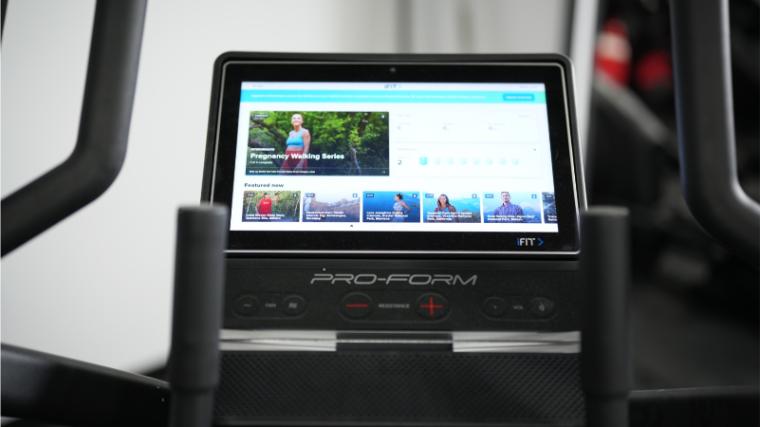
Before buying an elliptical with iFIT, know that you’ll need to pay a monthly subscription fee ($39 a month) to access its library of fitness classes. If you’re not interested in trainer-led workouts, you’ll likely be happy with one of the best ellipticals under $1,000. If you want a touchscreen monitor and heart rate monitor integrated with the machine, however, you can expect to pay a bit more.
When purchasing a used elliptical, check to see if the tech software and apps are outdated before buying the machine.
Warranty
Purchasing a new elliptical almost always comes with a warranty. In fact, not only will there be a manufacturer’s warranty, but you may also have an option to purchase an extended warranty from the store directly.
At minimum, make sure the warranty covers the lifetime of the frame. You also want at least two years of coverage on parts and labor. The more years offered on parts and labor coverage, the better. If it’s within your budget, we always recommend buying the maximum coverage possible.
Some brands, like Peloton, offer extended warranties that add lengthier coverage to labor, parts, and in-home maintenance. You can also explore third-party services that offer protection plans covering any elliptical brand or model. Typically, these companies, like Upsie, add three years of protection for a couple of bucks per month.
If you are purchasing a used elliptical, it’s important to ask the seller about the status of the warranty. If not, then look for a third-party service that offers a protection plan before purchase. These third-party vendors often require the exercise equipment to be less than four years old.
Stride Length
An elliptical’s stride length is the distance between foot pedals when they are at their furthest distance. Ideally, you want to purchase a machine with a stride length that closely matches your stride when walking. See the below chart to help determine the proper stride length for you.
| Your Height | Ideal Stride Length |
| Under 5’ | 11″-14″ |
| 5’0″ – 5’3″ | 14″-16″ |
| 5’4″ – 5’8″ | 16″-20″ |
| 5’9” – 6’0” | 18″-20″ |
| Over 6′ | 20″ and over |
[Related: Best Ellipticals for Short People]
Types of Elliptical Machines
Now that you know where to buy ellipticals and what to consider before purchasing, it’s time to decide which type of elliptical machine is best suited for your needs.
Front-Drive Elliptical
Front-drive ellipticals feature a flywheel in the front of the machine, which presents more of an incline when you first step onto the cross trainer.
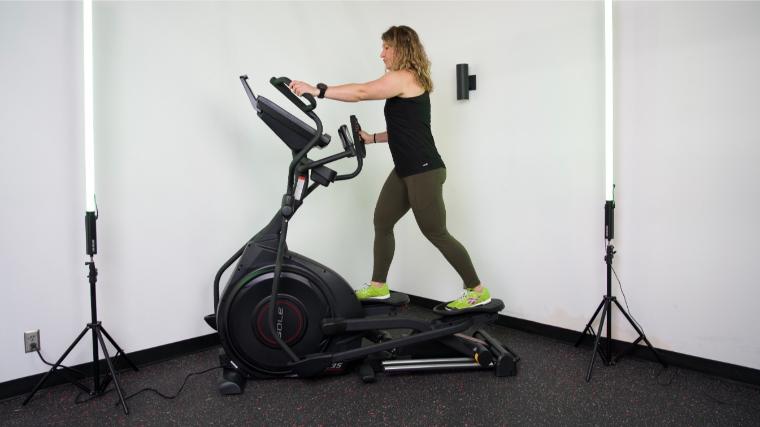
Front-drive ellipticals work to mimic running or walking up a hill, which can be a greater cardio workout. Compared to rear-drive ellipticals, front-drive models are often more compact and have shorter strides.
Rear-Drive Elliptical
With the flywheel located in the back, the best rear-drive ellipticals tend to be larger than their counterparts. Additionally, they often lack the incline and resistance levels found in front-drive models.
However, they can be easier on the joints than front-drive ellipticals due to the pedals being more horizontal. With longer strides, these machines evoke walking on flat surfaces better than other options.
Center-Drive Elliptical
As its name implies, center-drive ellipticals have a flywheel located in the center of the machine. These ellipticals put you in an upright position, promoting proper posture and helping to better mimic natural walking strides. They also tend to have smaller footprints than front- or rear-drive ellipticals.
Furthermore, since the spaces between the pedals are typically a bit narrower than on other ellipticals, they can potentially be a great piece of equipment for those struggling with limited mobility due to hip issues.
Hybrid Elliptical
For those unable to store or afford multiple pieces of cardio equipment in your home, hybrid ellipticals are the perfect solution. Hybrids combine two exercise machines into one, which gives you the best of both worlds for your home workout.
One popular hybrid example is an elliptical-bike combo machine, which combines the reclined seat of recumbent exercise bikes with the strides of an elliptical cross trainer. So not only can you sit with back support and pedal, but you can also stand upright and perform an elliptical movement.
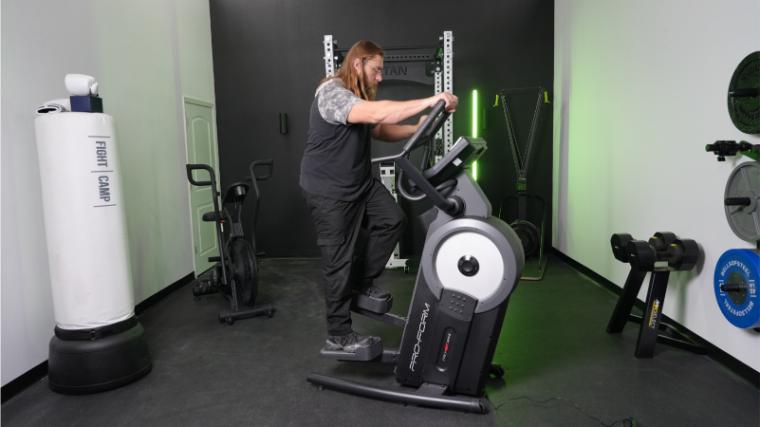
Another example of a hybrid trainer is the Pro HIIT H14, which is a combination of an elliptical and stair climber. This vertical, two-in-one machine provides intense lower-body workouts with the stepper and challenging upper-body workouts with the moving handlebars.
Under-Desk Elliptical
If you work long hours at a desk or have limited mobility, the best under-desk ellipticals can help you get a cardio session in while being sedentary. Compared to other trainers, these ellipticals are compact and lightweight enough to move from your desk to the couch and back again. They also tend to be less expensive than standard ellipticals.
Final Word
Purchasing an elliptical is an exciting commitment to your health. However, it’s not something you can just buy on a whim. Buying an elliptical trainer requires research and planning, as there are numerous factors to consider, including whether or not you want a new or used elliptical.
For starters, you need to determine your fitness goals, budget, and the type of elliptical that suits your needs. You’ll then want to consider if an online or in-person purchase is right for you, as well as how it’ll get from the warehouse to your home gym. Once you complete this research, you’ll be able to make an informed purchase and fully enjoy all of the benefits associated with an elliptical.
FAQs: Best Places to Buy Ellipticals
What is the best brand of elliptical machine?
With a wide variety of models, budget-friendly options, great customer service, and warranties that protect your investments, it’s hard to argue with NordicTrack’s fitness equipment. We think the NordicTrack AirGlide 14i, for example, is one of the best elliptical trainers on the market. This specific model has adjustable stride lengths, 26 levels of resistance, incline and decline options, and a wealth of tech options. This full-body trainer exemplifies why NordicTrack stands above its contemporaries in a highly competitive industry.
How much should you spend on an elliptical machine?
Ellipticals can cost anywhere from a few hundred dollars to well over $2,000. The amount of money you spend really comes down to your budget. Smaller budgets will require you to explore bare-bones and used ellipticals, while deep pockets can open you up to commercial ellipticals with steel builds and extensive tech features.
How do I choose an elliptical for my home?
First, you must identify your budget, fitness goals, and the type of elliptical that’s best suited for you. Then you need to figure out where to put the elliptical trainer in your home. These fitness machines must be stored in a temperature-controlled environment otherwise you can violate your warranty. They also require enough free space around the machine to perform an elliptical workout without bumping into walls and furniture or hitting your head on the ceiling.
References
- Prosser, L. A., Stanley, C. J., Norman, T. L., Park, H. S., & Damiano, D. L. (2011). Comparison of elliptical training, stationary cycling, treadmill walking and overground walking. Gait & Posture, 33(2), 244–250.